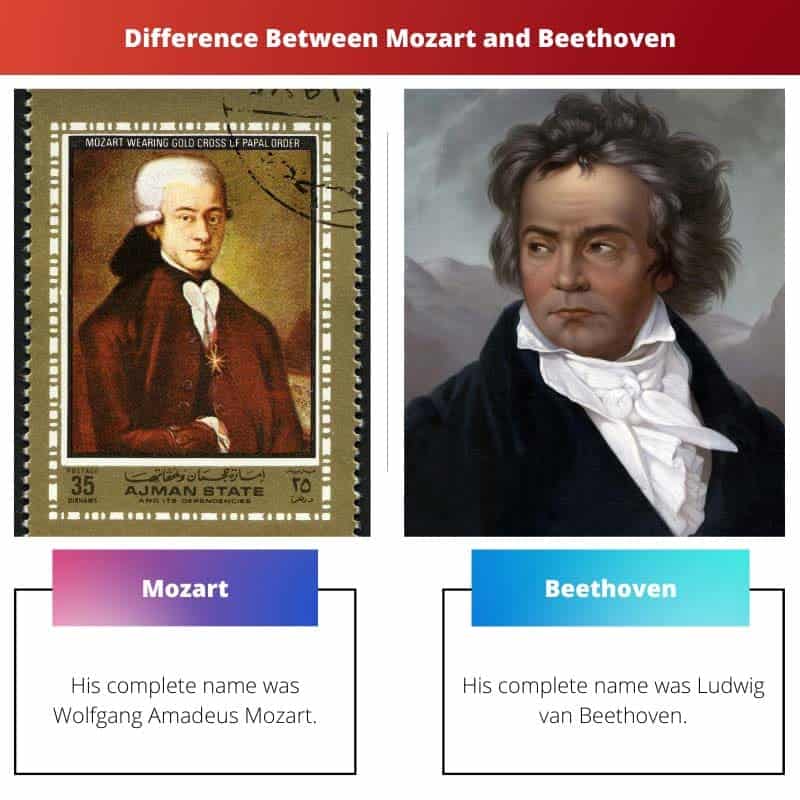Regardless of the genre, music is your closest buddy whether you’re feeling down, alone, or in any other negative mood. If you have a deep love of music, you could even try your hand at composition.
Almost any discussion of music will inevitably move to the great Western classical composers.
Key Takeaways
- Mozart was an Austrian composer who lived during the Classical period, while Beethoven was a German composer who straddled the Classical and Romantic periods.
- Mozart’s music is characterized by its clarity, balance, and precision, while Beethoven’s compositions are known for their emotional intensity and complexity.
- Mozart composed over 600 works, while Beethoven produced a smaller but equally influential body of work, including nine symphonies and 32 piano sonatas.
Mozart vs Beethoven
Mozart was a classical composer, known for his elegant and sophisticated music. He composed in many different genres, including opera, chamber music, and symphonies. Beethoven was a Romantic composer, known for his powerful and emotional music. He composed in many different genres, including symphonies, piano sonatas, and opera.

Salzburg, Austria, was the site of Wolfgang Amadeus Mozart’s birth on January 27, 1756. He was a bright youngster, creating his first piece at the age of five and going on to become a court musician at the age of seventeen.
He spent most of his adult life in Vienna, where he created his most significant works.
Ludwig van Beethoven was born on December 16, 1770, in Bonn, Germany, and is considered the father of classical music. He was one of the most prominent classical and romantic composers of his period.
He was a lover of Mozart and wanted to study with him, but he ended up studying with Haydn instead.
Comparison Table
| Parameters of Comparison | Mozart | Beethoven |
|---|---|---|
| Complete Name | His complete name was Wolfgang Amadeus Mozart | His complete name was Ludwig van Beethoven |
| Nature of Music | Often bright, breezy, and upbeat. | Reflective of his own turbulent, flaming brilliance as well as his passion for nature. |
| Music style | His style was Classical Music. | His style was Romantic Music. |
| Type of Composer | He was an Austrian Composer. | He was a German Composer. |
| Masterpiece | The marriage of Figaro was his masterpiece. | Missa Solemnis was his masterpiece. |
What is Mozart?
Mention Mozart to everyone who enjoys classical music, or at least understands the notion of “The Mozart effect,” and you’ll hear references to renowned compositions that have been included in films, recorded by many ensembles, and so on.
The Classical period in music straddles the Baroque (Bach’s time) and Romantic (partly Beethoven’s time).
So, for example, if you listen to Bach’s compositions first, which are rather heavy and ponderous with tonnes of counterpoint, and then to Mozart, you’ll notice a slight but obvious transition to a lighter, clearer melodic-harmonic framework.
Despite this, counterpoint was still used throughout Mozart’s lifetime, but a lighter, more cheerful tone replaced the darker, more serious sound.
He capitalized on it, especially in his masterpiece “Marriage of Figaro.” Of course, “Marriage of Figaro” is simply a start. His works include opera, concertos, sonatas, and symphonies.
A little study (some of which he purportedly created in his infancy) and you’ll have months of listening fodder. Astonishingly, Mozart’s work has a distinct style that is identifiable by the time in which it was composed.
Mozart had such an impact on Western classical music that psychologists made a huge deal out of the idea that listening to Mozart enhances one’s IQ.

What is Beethoven?
Anyone who knows anything about this really “immortal” composer knows that Ludwig van Beethoven endured a slew of personal trials and tribulations, yet he persevered and continued to write in the face of them all.
Those who look a little deeper realize that when he genuinely started making music, he did it under the shadow of Mozart, producing pieces that would have earned Wolfgang a great deal of praise.
Although it may seem ironic, Beethoven never genuinely set out to be a composer only for the sake of becoming a composer.
His primary focus was on learning and performing the works of others, which he did very well in, and which he considered his strongest discipline.
More or less by chance, he ended up being interested in composition and studying it under the tutelage of Franz Joseph Haydn, who was Mozart’s contemporarily living contemporary.
He wrote throughout a lengthy period of time, although most of his more well-known work was produced in the latter half of his life, as did much of his other work.
One such piece is the Missa Solemnis, which is also known as the “Ode to Joy.” Another is the 9th Symphony, which features the choral tapestry of sound known as the An Die Freude, which translates as “Ode to Joy.”

Main Differences Between Mozart and Beethoven
- Mozart’s music is bright, breezy, and upbeat. He even incorporates a “floating” element into his more serious work, Ave Verum, which causes the listener to feel lighter in spirit at its conclusion. whereas Beethoven composed music that was profoundly reflective of his own turbulent, flaming brilliance as well as his passion for nature.
- Wolfgang Amadeus Mozart was an Austrian composer, whereas Ludwig van Beethoven was a German.
- Mozart’s work was simple enough even for those with less musical ability to perform, whilst Beethoven’s was more difficult.
- Mozart’s music was clear, precise, and pleasing to the ear, whereas Beethoven’s music was not.
- Mozart was a classical composer, whereas Beethoven laid the groundwork for romanticism.

References
- https://online.ucpress.edu/mp/article-abstract/7/1/15/46460
- https://search.proquest.com/openview/1c2f6726fc9a9f6ee28fe3276d8287a4/1?pq-origsite=gscholar&cbl=18750&diss=y

This is an insightful piece for all classical music enthusiasts.
It was enjoyable to read and truly educational.
Agreed, the details are presented remarkably well.
Such a beautifully written comparison of the two musical maestros.
Well-structured and thoroughly enlightening.
An exemplary piece that offers true musical insight.
Wonderful piece on the lives of these two geniuses.
Absolutely! They were the greatest.
The expertise of these composers has truly been showcased.
Impressive depiction, indeed.
Couldn’t agree more.
Cleverly written and informative.